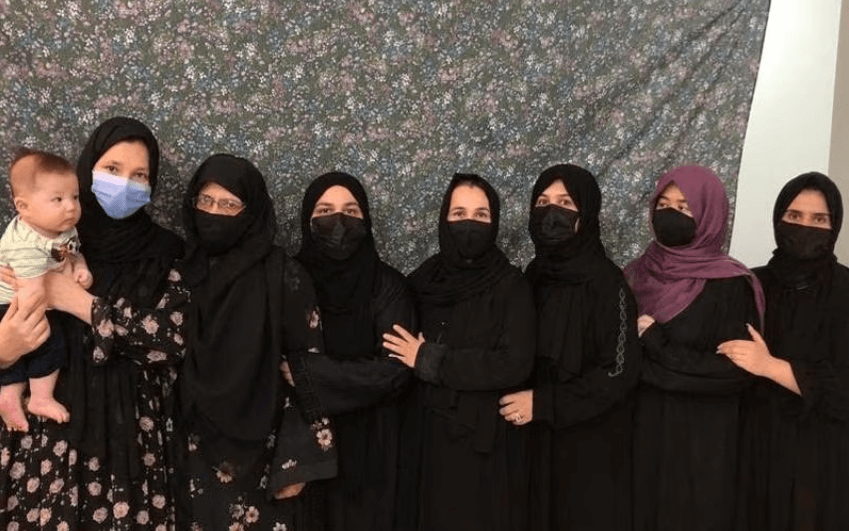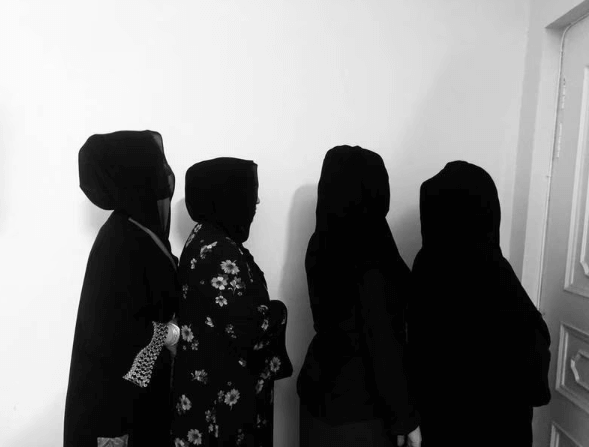
Afghanistan’s female judges haunted by Taliban threats
For nearly a decade, Noora Hashimi, a 38-year-old lawyer worked as a prosecutor in Afghanistan. Her job, which entailed investigating cases of violence against women and children, gave her a deep sense of purpose and satisfaction.
“I worked very hard, day and night, to ensure that every person whose case I dealt with was treated fairly and justly,” Ms Hashimi told The National. “That no one was denied justice and those who didn’t commit any crime are not wronged.”
But today, Ms Hashimi – who asked for her name to be changed to protect her identity – is a hunted woman. Since the Taliban takeover of Afghanistan in August 2021, she has received repeated threats to her life.
The threats are not solely from the militant group in power but also from several criminals she helped put behind bars who were later released by the Taliban when they took over the country.
“Many of those convicted did not accept their crimes and they would blame the lawyers and judges for their situation,” Ms Hashimi said. “But when the Taliban arrived, they released all prisoners, some of whom were very dangerous criminals, who are now seeking revenge against the prosecutors and judges.”
In previous years, the Attorney General’s office in Pakistan was attacked by the Taliban several times. Ms Hashimi has survived assassination attempts, in which she lost two close colleagues. While she was no stranger to threats, she says that a lack of a functioning government in Afghanistan has left her and her family vulnerable to attacks from vengeful criminal groups.
For nearly two years, she has frequently changed her location in Afghanistan, in constant fear for her family’s life. “In that time, we have watched our colleagues get martyred,” she said.
Ms Hashimi’s claim was backed by the Association of Prosecuting Attorneys, a US-based organisation, campaigning for support of their Afghan counterparts.
“According to the data we have gathered, 28 prosecutors and their family members have been killed over the past two years,” Najia Mahmodi, former chief prosecutor in Afghanistan, and member of the Afghan chapter of the APA (called APA-AF) told The National. The NGO offers support to at-risk Afghan lawyers and judges in the country.
Ms Mahmodi was among the few judges who were evacuated in the early days of the Taliban takeover two years ago, leaving behind a carefully built life and career. She now spends her days working tirelessly to help less fortunate colleagues.

“APA-AF has identified over 3,800 prosecutors and key staff members that remain in Afghanistan, who are at great risk, living in fear, unemployed and in need of urgent assistance and relocation,” she said.
APA is attempting to raise funds to help relocate and support at least 1,500 of those Afghan prosecutors who are deemed in immediate danger.
Similar findings were reported by the UN this year. “More than a dozen prosecutors reportedly have been killed by unknown individuals in Kabul and other provinces, though this is likely an undercount,” Mr Richard Bennett, UN special rapporteur, said in January.
Ms Mahmodi said: “Most of them can’t even leave because they don’t have passports, or have families they are responsible for and can’t leave behind,”. In the absence of a functioning system and bureaucracy, obtaining passports can be a huge challenge, she added.
“It is especially hard for those who worked as prosecutors, who worked on the ground, often facing The Taliban and other criminals, and they are in hiding. Some haven’t left their home in over two years, facing the danger of being recognised,” she said.
Many Afghan prosecutors and judges are living in safe houses across Afghanistan, as well as in neighbouring countries.
Meena, who’s name has also been changed to protect her identity, is one of the Afghan judges who hasn’t been able to leave her home for wo years.
After several months of living like a nomad to avoid being caught, Meena now remains housebound. “I feel I have become a prisoner at home. I can’t go outside freely like other ordinary women, without fear of being caught,” she told The National.
The UN report also emphasised the grave threats to those “who investigated and prosecuted members of the Taliban”.
“Reports indicate that criminal offenders who were released by the Taliban have also sought to carry out reprisals against prosecutors and judges,” it stated. “This includes women officials who face threats because they were involved in the prosecution and sentencing of perpetrators of violence against women, as well as terrorism cases.”
Meena’s current existence is in sharp contrast to her previous life as a legal authority overseeing criminal and terrorist cases. But her work has put her in direct conflict with the Taliban. “They have threatened me, and beat up my brother and father-in-law. I still get messages that say ‘when we find you, we will kill you and your family,’” she said.
Ms Mahmodi, who once led the crimes against women division at the Afghan Attorney General’s Office, is all too familiar with the threats facing her colleagues.
“Even before the Taliban takeover, I faced risks to my life for my work. I lost two of my dearest colleagues to Taliban attacks,” she said. “I had to constantly change my location and vehicle while travelling to work. Even before Covid, I used to wear face masks to hide my identity and would carry a change of clothes to prevent being recognised.”
But despite the challenges, she said she loved her work.
“It was rewarding to think I could help the women of Afghanistan,” she added.

In a nascent democracy that was once Afghanistan, the legal fraternity played a crucial role in providing a semblance of law and order in an otherwise chaotic society.
However, the trajectory taken by the legal sector – one that Ms Mahmodi helped build over the past decade – has been painful to watch.
“Afghanistan has changed a lot in the last two years, we went back by a century,” she told The National. “Women have been erased from society. Legal systems have collapsed. There is no authority in Afghanistan to process or litigate cases regarding women, families or for that matter any other legal concerns of the citizens.
“Lawyers, judges and prosecutors can’t even show they exist in Afghanistan, let alone use their degrees and expertise to defend the innocent.”
Her words were echoed by Ms Hashimi. “A country is defined by its legal systems and constitution, one that clearly identifies the rights and responsibilities of a citizen. This was what we worked to create and implement – a country with a legal system. But there isn’t anything like that in Afghanistan any more.
“It is very hard to accept that we lost everything,” she concluded, with a heavy sigh.
